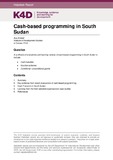Cash-Based Programming in South Sudan
Abstract
This rapid review provides a synthesis of evaluations and learning reviews of cash-based programming in South Sudan. There is evidence that in South Sudan the cash-based programming help poor households address food needs and nutrition; and by injecting funds from vouchers, paid work, or grants into the local economy affect local markets. These cash based programmes are changing Sudanese society by affecting traditional kinship relationships and social safety networks; and affecting livelihood strategies as people are switching from subsistence to market-based activities. The review identifies and explains how injecting money into communities in growing volume influences the organisation of Sudanese society, including rebel groups and others who might profit. Additional material in this Helpdesk report is drawn from information published or presented by implementing agencies. This provides some evidence from South Sudan that cash based programmes bring numerous advantages. Both in terms of impact (improved nutrition, increased spending, assets replaced or added, children in school, women taking control over household spending). Also in terms of implementation (speed of delivery, efficiency and reduced transaction costs, the way in which cash transfers are delivered can help empower the target community – and the local community and market that surrounds them). The review prioritised information from 2014-2018 to provide more recent assessments of the impact from cash based programmes. There are few recent formal evaluations of cash transfer programmes although this strategy is mentioned within wider evaluations (WFP portfolio evaluation 2011-2016; Inter Agency Humanitarian Emergency evaluation 2015). However, gender considerations are often lacking from the evaluation literature. Where gender is considered the impact for women is largely assumed to be positive with women gaining purchasing power, making joint decisions about spending, and abandoning some high risk activity (collecting firewood from remote locations). Unfortunately, disaggregated data is not readily available. Although it is likely that activities targeted at the most vulnerable households would include a high proportion of households headed by women, or with vulnerable children under 5 years, or with a disabled family member this report is not able to verify if this was the case.
Citation
Enfield, S. (2018). Cash based programming in South Sudan. K4D Helpdesk Report. Brighton, UK: Institute of Development StudiesIs part of series
K4D Helpdesk Report;467Rights holder
© DFID - Crown copyright 2018.Collections
- K4D [937]

